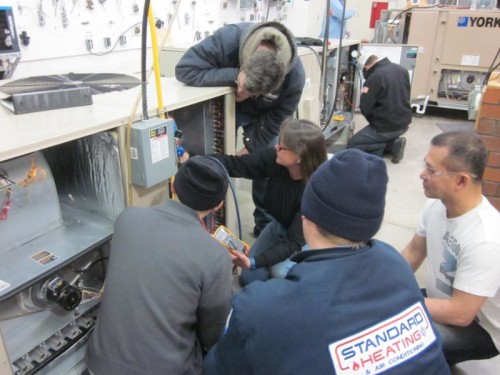Hennepin Technical College: Teaching Tomorrow’s HVAC/R Techs
For those who have already chosen HVAC/R as a career, or those who might be considering entering the field, one thing is for sure: The future is bright.
According the 2014 Bureau of Labor Statics, the HVAC/R field is projected to grow by 14 percent over the next 10 years, which is much faster than average for all occupations through 2022.
The demand for educated HVAC/R technicians is due to a number of factors, including a boom in the commercial and residential construction industry and a shortage of men and women who want to make HVAC/R their career calling.
Rhonda Wiggins, a professor with the HVAC/R program at Hennepin Technical College, located in Minnesota, is excited about the outlook for the HVAC/R field.
“The job market is very good,” says Wiggins. “Students in our program know that the demand for HVAC/R technicians is strong. But they also realize that it’s still a very competitive industry to find the best jobs.”
For those interested in entering the HVAC/R field, a technical school education is often times, the first and most crucial step.
To earn a degree in HVAC/R, students have a couple of options. Most institutions, such as Hennepin Technical College, offer students the option of earning two diplomas over the course of two years: one residential and one commercial. Alternatively, they can take a few more General Education classes to receive an Associate of Applied Science (AAS) degree.
“I encourage my students to obtain all three awards,” Wiggins says.
Over the past nine years that Wiggins has been teaching, she has noticed an increase in opportunity for students to get jobs.
“Take for example my most recent class, which finished their work in December 2015,” says Wiggins. “The comment that I kept hearing over and over again was that most of them were anticipating that they would just be beginning their job search by graduation. But in reality, many of them were on their second or even third job by the time they graduated. More opportunities came along as the students increased their skill set.”
With hands-on learning in the lab, students in HVAC/R programs will learn about theory and physics of energy, mechanical skills as well as electricity. While the investment of two years of schooling can seem like a lot of time to commit to, it’s important to keep in mind that HVAC/R is a career, not simply a job. Opportunities for those in the field range from being a residential service technician, a commercial service technician, building maintenance engineer, sales, and any number of sub-specialties within the trade.
While the investment of two years of schooling can seem like a lot of time to commit to, it’s important to keep in mind that HVAC/R is a career, not simply a job. Opportunities for those in the field range from being a residential service technician, a commercial service technician, building maintenance engineer, sales, and any number of sub-specialties within the trade.
According to Wiggins, many Hennepin Technical College HVAC/R students set their sights on large local organizations such as the Minneapolis Pipefitters, the St. Paul Pipefitters, or CenterPoint Energy. But the reality is, students must be prepared for a wide range of employment opportunities within the HVAC/R industry over the course of their careers. Especially as new technologies transform the industry.
“The goal of our program is to teach the fundamentals of the HVAC/R field so students can easily enter it,” Wiggins says. “That’s important. But what’s more important is that our students learn how to learn, because for technicians, learning is something that will never stop.”


